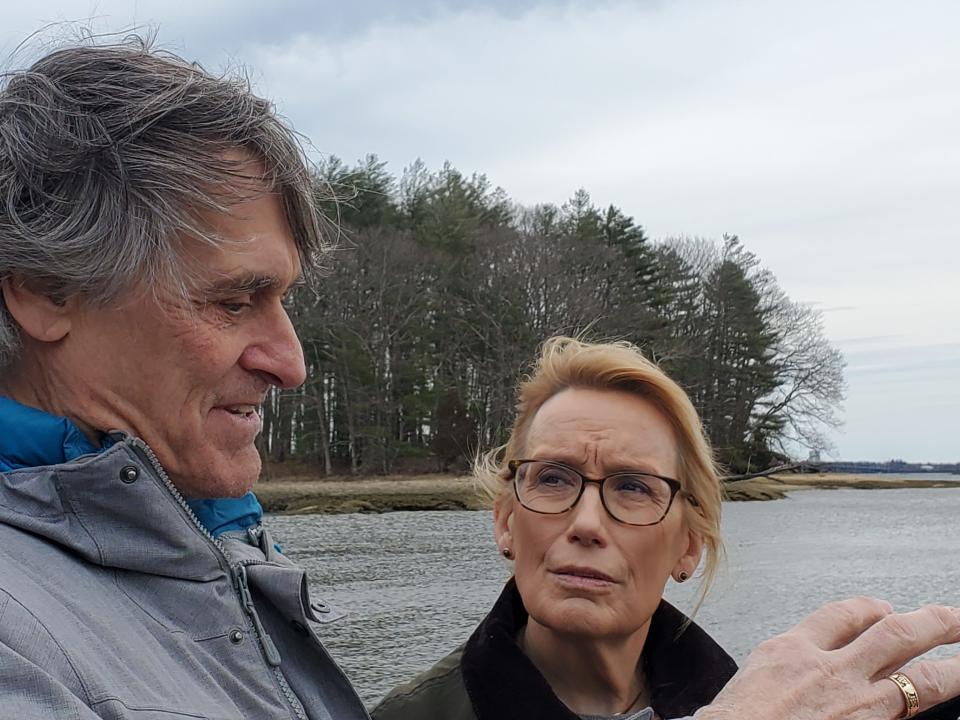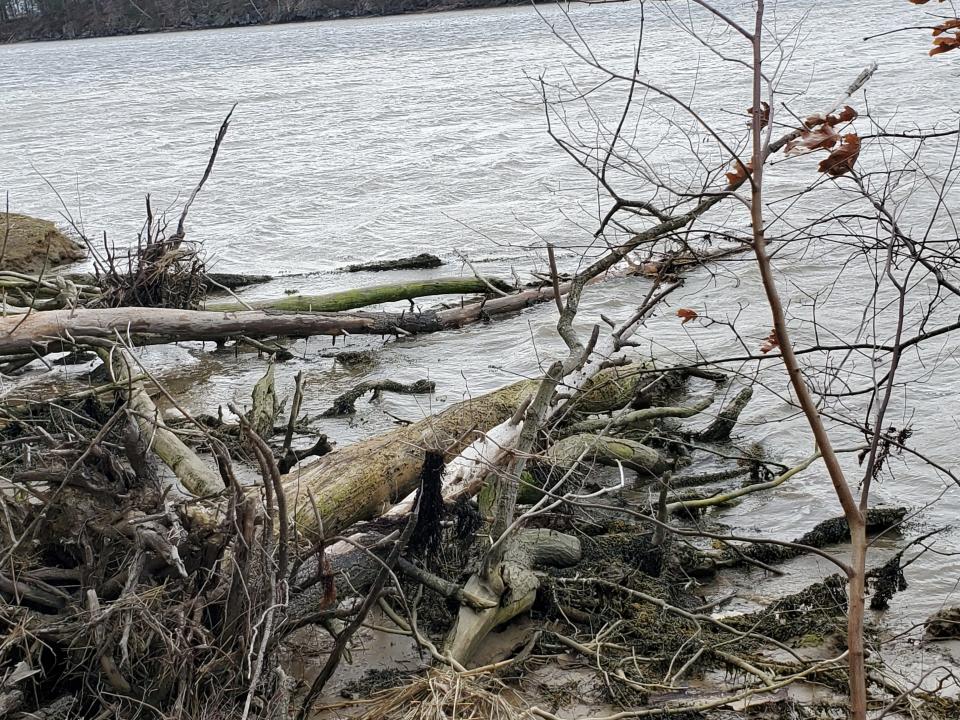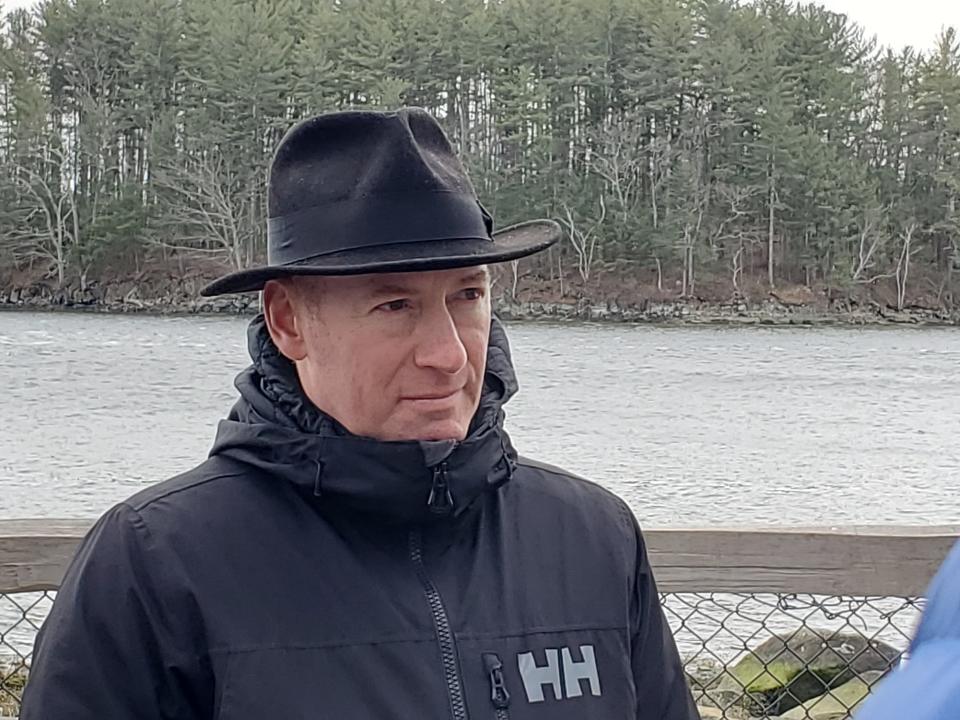Shoring up Wagon Hill Farm for future: Sen. Hassan backs $2M grant for Durham jewel
- Oops!Something went wrong.Please try again later.
DURHAM — Sen. Maggie Hassan, D-New Hampshire, visited Wagon Hill Farm Friday to learn more about the dangers of erosion along its shoreline and to support a federal grant to address the damage.
Town officials, working with scientists at the University of New Hampshire, and coastal experts at the NH Department of Environmental Services, are preparing a grant application seeking about $2 million to continue work already begun to restore and protect the shoreline of Wagon Hill Farm, a jewel of a property offering recreation access for area residents, for special events and as a popular place to exercise dogs.
Town Councilor Wayne Burton is the steward of Wagon Hill. He said he is part of the group that saved the property from development, making it a resource for the town in 1989.

More local news: Peanut butter for sexual favors at Strafford County jail. Woman speaks out, officer admits misconduct.
Burton said the property is 139 acres, 99 on one side of Route 4 and about 40 acres across the street. The farm on the land one of the oldest in the state.
"This is a regional asset," said Burton. "We did a restoration project on about 300 linear feet of shoreline. Now we hope the grant will allow us to complete the project for the rest of the 2,100 feet."

The National Fish and Wildlife Foundation announced the 2023 National Coastal Resilience Fund's request for proposals. NFWF will make investments in planning, design, and implementation of natural and nature-based solutions. The goal is to enhance protections for coastal communities from the impacts of storms, floods, and other natural coastal hazards and to improve habitats for fish and wildlife.
Hassan said the economic impact of coastal erosion affects New Hampshire people's homes, businesses, way of life and the climate.

"So, it's really important to come here today and talk with the people from Durham, the state of New Hampshire and UNH, who are using federal dollars to do this work and who are applying for more federal dollars under the infrastructure law," she said. "I wanted to see how it's going and see what the impact of funding this project will be. Sadly, we are seeing serious erosion and sea level rise. I was heartened by seeing that when we invest in science and community-based, nature-based solutions, we really slow this erosion and the sea level rise. Thanks to the infrastructure law, we are seeing these nature-based solutions here in New Hampshire."
Hassan said New Hampshire towns don't generally have grant writers on staff.
"So our office wants to make sure we can support our local communities in applying for this funding," Hassan said. "We want to make sure communities who have started down this path can continue and can continue to share their expertise with New Hampshire. We want to make sure there is long term support for the maintenance of this kind of project."
Shoreline restoration at Wagon Hill Farm
Durham Town Administrator Todd Selig on Friday provided a written narrative on the history of the living shoreline project at Wagon Hill Farm. Here is a slightly abbreviated version of what he wrote:

In 2019, the town of Durham, in partnership with New Hampshire Department of Environmental Services, the University of New Hampshire and the Great Bay National Estuarine Research Reserve, finalized a design and installed a living shoreline along the tidal portion of the Oyster River at Wagon Hill Farm – the first of its kind in the state.
This project was designed specifically to reduce erosion, replace salt marsh habitat that had been lost or damaged, improve shoreline appearance, and accommodate salt marsh migration resulting from sea-level rise.
Commentary by Oyster River sophomore: We students are taking a stand on school shootings. Will government hear us?
Over 30 years ago, the town purchased the land for what is now Wagon Hill Farm, which quickly became a favorite place to recreate amongst outdoor-loving residents and visitors. The southern 99 acres of the approximately 139-acre property is beloved for its extensive three-mile trail network.
Since purchasing the property, shoreline erosion at rates of up to one foot per year has been an issue of concern for the town. The erosion worsened with time, resulting in significant salt marsh and land loss at the water’s edge. As a result, the town moved the fence along the shoreline back, which was done several times over the years, to try and guide visitor traffic away from sensitive areas. Studies, like a 2009 stewardship plan, alerted the town to possible causes of the erosion, including waves, boat wakes, and human influences such as people and their dogs walking on the marsh shoreline.
To begin restoration of the shoreline and combat future erosion associated with projected sea level rise, the town received funding from the NHDES Coastal Program in 2016. The $20,000 grant allowed the town to partner with NHDES and UNH to monitor, assess, and design alternatives for shoreline stabilization.
Additional funding in 2017 and 2018 from NHDES’ Coastal Program and its Aquatic Resources Mitigation Fund, allowed the town and its partners to design and install the living shoreline.
Important design features included building a stone and tree root wad sill – or barrier – at the edge of the shoreline to help reduce wave energy; backfilling behind the sill to restore salt marsh area that had been lost; ensuring the upland slope was gradual enough to enable salt marsh migration; planting over 30,000 new saltmarsh plants with volunteers; and installing 750 feet worth of fence to reroute foot (and paw!) traffic.
What is planned in the future at Wagon Hill Farm: 2023 and beyond
The goal for the next phase of the project in 2023-24 is to advance the living shoreline pipeline in New Hampshire by extending the living shoreline pipeline created in 2019, Selig wrote.
The town’s 2020 grant developed preliminary designs extending the existing living shoreline 1,800 feet westward. The additional living shoreline effort will stabilize severe erosion and increase adaptive capacity of important habitat/recreation space as sea levels rise associated with climate change. Fish, at multiple life stages, and waterfowl will benefit, Selig wrote.
Public meetings will seek public involvement and education about the shoreline issues. In spring 2024, if funds are awarded to Durham, they will be used to construct the living shoreline; implement a landscape management plan to manage drainage, address tree shading, and guide foot traffic; engage volunteers and educate residents and students about the effort through community activities and signage, present a professional training opportunity at the site and monitor outcomes.
A message for Wagon Hill Farm visitors
In order to ensure the long-term health of the salt marsh vegetation, Selig asks those who frequent the trails to appreciate and respect the work put into protecting this special resource. This includes sticking to the specified water access point outside of the fence barrier, viewing the living shoreline from the trail or the observation platform (perfect for photos), and refraining from walking or allowing dogs on the restored marsh surface. The success of the living shoreline at Wagon Hill depends upon thriving salt marsh vegetation.
Wagon Hill Farm is open to the public between dusk and dawn, with dogs allowed off-leash between dawn and 10 a.m. Allowed uses include hiking, running, snowshoeing, cross country skiing, bicycling and dog walking.
This article originally appeared on Fosters Daily Democrat: Hassan visits Durham to support $2M Wagon Hill Farm shoreline grant

